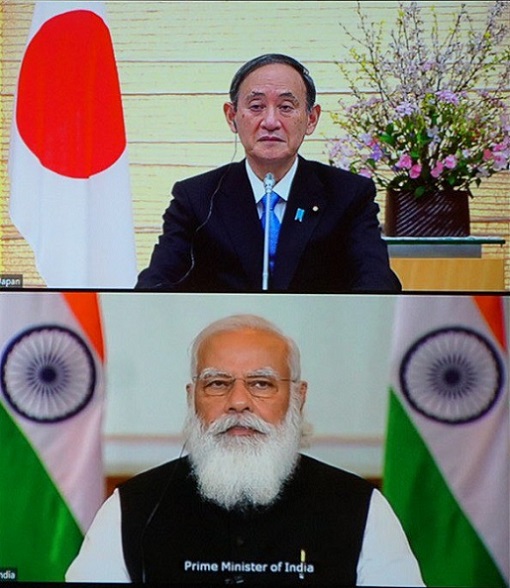India and Japan, two countries having strong cultural and civilizational ties, have joined hands to fight the ongoing Covid-19 pandemic while strengthening cooperation in other areas at the same time. In a 25-minute conversation Monday afternoon, Indian Prime Minister Narendra Modi and his Japanese counterpart Yoshiwei Suga discussed the Covid-19 situation in their respective countries and also exchanged views on various regional and global challenges posed by the pandemic.
India has registered 3,52,991 new Covid-19 positive cases in the last 24 hours and the total Active Caseload has reached 28,13,658. However, India's cumulative recoveries stand at 1,43,04,382 Monday with the National Recovery Rate at 82.62%.
Meanwhile in Japan, a third state of emergency was ordered on Sunday for capital Tokyo, Kyoto, Osaka and Hyogo prefectures till May 11 in order to prevent the spread of Covid-19 virus and thoroughly curb the flow of people during the Golden Week holiday. The death toll from Covid-19 in the country reached 10,000 today.
Both Modi and Suga highlighted the importance of close India-Japan cooperation to overcome these challenges, such as by working together to create resilient, diversified and trustworthy supply chains, ensuring reliable supply of critical materials and technologies, and developing new partnerships in manufacturing and skill development.
"Prime Minister Suga stated that he hopes that the situation of the new corona in India will improve as soon as possible under the leadership of Prime Minister Modi, and that Japan and India will work closely together to overcome the new corona," said the Japanese Foreign Ministry.
Prime Minister Modi thanked PM Suga for providing assistance to India for combating the pandemic and both leaders appreciated the support and facilitation provided to resident citizens in each other’s country during the pandemic with a resolve to continue such coordination.
They also confirmed the importance of Japan-India cooperation and multilateral cooperation including Japan, the United States, Australia and India toward the realization of a "free and open Indo-Pacific", and a free and open international order based on the rule of law.
The Japanese PM stated that he would like to further promote cooperation in areas such as cyber, digital, decarbonization, healthcare, and strengthening connectivity, laying 5G and submarine cables, strengthening industrial competitiveness, diversifying supply chains, and northeastern India.
In this context, the two leaders emphasized the need for early operationalization of the Specified Skilled workers (SSW) agreement in order to synergize their strengths and achieve mutually beneficial outcomes. They also highlighted the Mumbai-Ahmedabad High Speed Rail (MAHSR) project as a shining example of their cooperation and welcomed the steady progress in its execution.
The Japanese PM also stated that he was seriously concerned about the continuation and strengthening of China's unilateral attempts to change the status quo in the East China Sea and South China Sea, including the Maritime Police Law.
ALSO READ: India's North East can help shape Asia's future, says Japan

Growing partnership
India and Japan continue to make joint efforts to enhance connectivity, especially in India’s North East and Bangladesh, to cope with various challenges the region faces.
The Indo-Pacific Oceans Initiative (IPOI) has been given a major thrust under the present leadership of both the countries.
Japanese Ambassador to India Satoshi Suzuki had said last month that India's North East remains a focus area for Japan in its quest for a free and open Indo-Pacific. With the North East itself not having an outlet to the sea, Japan and India continue to work closely in the region, upgrading highways all the way to the border with Bangladesh.
"If you look at all these joint efforts by Japan and India in a holistic view, there appears a dynamic connectivity network in which Japan-India collaboration provides the landlocked North East with access to the Bay of Bengal and beyond, most importantly to ASEAN countries. As IPOI rightly captures, the Indo-Pacific maritime domain is the source of growth and prosperity, so better access to these Oceans is vital for the improvement of people’s lives," Suzuki said during a webinar.
Japan is also partnering India in building the 20 km, four-lane bridge between Dhubri in Assam and Phulbari in Meghalaya. Besides the North East, Tokyo has undertaken a number of connectivity initiatives in India, including mega projects like the Mumbai-Ahmedabad High Speed Rail, the Western Dedicated Freight Corridor (DFC), the Delhi-Mumbai Industrial Corridor, the Chennai-Bengaluru Industrial Corridor (CBIC).
The partnership is expected to get a further boost when Suga visits India later this year, once the Covid-19 situation stabilizes.




















